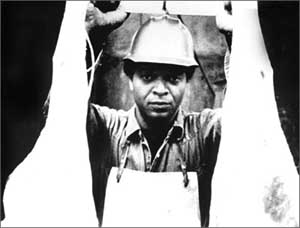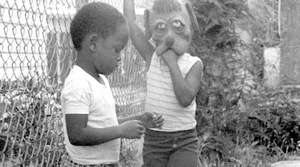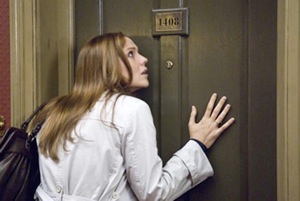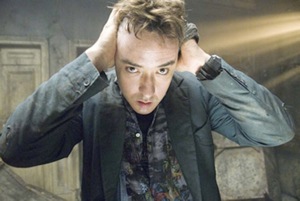Arts & Entertainment
Out at the movies
'Killer of Sheep' (1977) and '1408' reviewed
Published Thursday, 28-Jun-2007 in issue 1018
Killer of Sheep (1977)
Directed, written, produced and edited by Charles Burnett
Starring: Henry Gayle Sanders, Kaycee Moore, Charles Bracy and Jack Drummond
80 min.
“Hollywood wasn’t accessible to black independent filmmakers, or films by people of color, unless they were black exploitation films. You never expected anything from Hollywood. Filmmaking was for you making personal and political statements.”
– Charles Burnett
Shot over the course of 52 weekends with non-professional actors and at a cost of $10,000, Killer of Sheep was unlike anything movie audiences had seen at the time of its release.
That is, providing they had a chance to see it.
Killer of Sheep opened just as the hard-R-rated blaxploitation craze had all but run its course. Most of these revenge-filled potboilers were produced and directed by The Man and their formulas were simple: whitey oppresses for three reels, followed by two reels of non-stop violent reprisal at the hands of brothers Truck Turner and Drum or sisters Coffy and Cleopatra Jones.
Fred Williamson, Pam Grier and Jim Brown were out and role models Mohamed Ali (The Greatest), Richard Pryor (Greased Lightning) and just about every unemployed black comic (A Piece of the Action) were in. While no more cinematically competent than their action predecessors, at least the latter two pictures were directed by African-Americans.
With urban theatrical arteries clogged with this type of product, it’s no wonder that Killer of Sheep failed to crack the mainstream. It played a handful of festivals and college cinema societies before taking home the Critics Award at the Berlin International Film Festival in 1981 and falling into oblivion.
Ten years later, it was entered into the Library of Congress National Film Registry, and in 2002 the National Society of Film Critics voted it one of the 100 essential films of all time. Thirty years after the fact and the film is finally ready for a theatrical release.
Killer of Sheep offers simple, calmly understated glimpses into Watts in the mid-’70s through the eyes of slaughterhouse worker Stan (Henry Gayle Sanders). There’s little action per se or physical violence. Although two friends plotting a murder ask Stan to drive the getaway car, his life involves wholesale slaughter, not homicide.
A susceptible dreamer, the task of gutting sheep all day begins to deaden Stan to life’s realities. He harshly scolds his young son Stan Jr. (Jack Drummond) for not coming to the aid of his brother in a street fight. His daughter (Angela Burnett) spends most of her day hiding behind a sad-faced rubber dog mask.
Stan both loves and respects his wife (Kaycee Moore), something practically unheard of in black films from that era. Burnett understands this and makes sure to give the couple several shared moments of quiet dignity.
Contemporary audiences eager to be condescended to are likely to be bored silly by Killer of Sheep’s straightforward simplicity. In the press notes, Burnett explains: “I have no interest to do cars banging into each other … most of the films I like to do aren’t very commercial. They’re not high concept. They’re hard to pitch to executives. They’re character-driven and theme-driven. I mean, I’m not trying to be sophisticated, but my movies are not designed for 18-year-olds.”
One thing Burnett borrowed from his Hollywood contemporaries is a wall-to-wall soundtrack comprised of pre-existing songs. Instead of audio wallpaper, Burnett bolsters his visuals with an “aural history of African-American popular music.” The film originally ended with Dinah Washington’s “Unforgettable” playing over the final slaughterhouse sequence. Unable to secure the rights, Burnett opted to reprise Washington’s “This Bitter Earth,” which previously accompanied a tender dance scene between Stan and his wife. The substitution is an improvement. “Unforgettable” may have added a touch of irony, but using a song to connect a scene of intimacy with that of Stan’s hellacious working environment turned out to be a masterstroke.
The reason Killer of Sheep has been unavailable has nothing to do with the film’s quality. No shame or embarrassment, as is the case of Porgy & Bess, which the Gershwin Estate has withheld for more than 30 years. No one could afford the cash necessary to clear the soundtrack royalties.
After three decades in oblivion, Killer of Sheep is finally ready to find an audience. Kudos to the UCLA Film & Television Archive for a magnificent 35mm preservation job and distributor Milestone Films for allowing us a chance to rediscover this monumental masterpiece.
Rating: four stars
1408
Directed by Mikael Håfström
Written by Matt Greenberg, Scott Alexander and Larry Karaszewski from a short story by Stephen King
Starring: John Cusack, Mary McCormick, Samuel L. Jackson and Len Cariou
94 min. in CinemaScope
Once again Stephen King entombs an author in a hotel of horrors, this time to less than shining results.
SoCal scribe Mike Enslin (John Cusack) specializes in tour guides to ghostly hotels. Book sales must be up (he was commissioned to pen a fourth book), but you’d be hard pressed to notice given the abysmal turnout for his most recent in-store appearance.
Siphoning through the junk mail and bills, Mike spots a postcard from New York’s Dolphin Hotel with a chilling challenge scrawled across the reverse: “Don’t Enter 1408!” So long Hermosa Beach, Hello Big Bloodcurdling Apple!
One can’t accuse Dolphin manager Gerald Olin (Samuel L. Jackson) of deceptive advertising when he admits up front, “It’s an evil fucking room.” With a record of 56 kills, Olin is delighted to keep the room in a permanent state of “No Vacancy.” With a little coaxing from Mike’s attorney, by law if a room sits unoccupied the hotelier is bound to rent it, Olin grants the author a one-night stay in the soured suite.
Instead of spooks, an initial scan of the room with an ultra-violet lightsaber uncovers little more than a cluster of horrifying bed stains. Mike wonders whether the reason most occupants don’t last more than 60-minutes is because they succumb from boredom.
At the stroke of 8, the clock radio transforms into an LCD stopwatch and begins counting down Mike’s final hour. Even that doesn’t seem to fluster him. Nor do numerous floating apparitions (including a specter wearing a Steven Wright mask), a return appearance from dear dead dad (Len Cariou) or, most unnerving of all, the incessant sound of a closed-circuit broadcast of The Carpenter’s “We’ve Only Just Begun” on the radio.
Long before we even begin to reach an explanation, director Mikael Håfström has already hammered us with cheap techniques, most noticeably placing his camera where it doesn’t belong (i.e., inside Mike’s P.O. Box or behind a microfiche viewer). The paranormal high jinx and cinematic trickery can only carry so much of the story, and movies like this are generally made or broken in the last half hour.
The shocks are rapidly replaced by cheap sentimentality. Instead of maintaining a state of heightened psychological surrealism, schlockmeister Stephen King resorts to mushy melodrama. It’s another family in hell with guilt-ridden Mike, his estranged wife (Mary McCormick) and the ghost of their dead daughter Katie (Jasmine Jessica Anthony). One nice touch has dad receiving little Katie’s dress via fax machine.
Cusack and Jackson are always a pleasure to watch. Too bad the script called for just one scene between them. If you missed Vacancy and Bug and find yourself in dire need of a horror fix, this will do for the moment.
Rating: two stars
|
|
Copyright © 2003-2025 Uptown Publications





